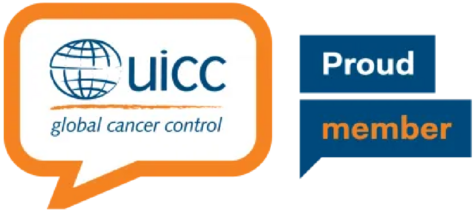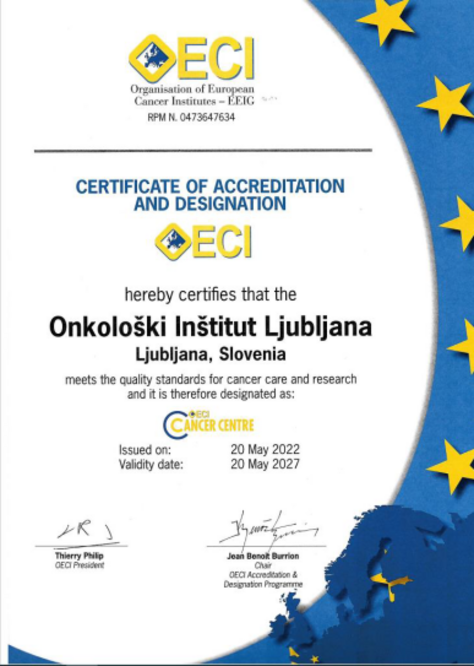About us
International Cooperation - Accreditations
The Institute of Oncology is a member of two prominent international organizations that foster collaboration among key players in cancer prevention and treatment. Through these partnerships, the Institute actively contributes to global cancer control efforts.

UICC – International Union Against Cancer
UICC – International Union Against Cancer is the only international non-governmental organization dedicated to global cancer control. Its vision is a future where cancer is no longer a life-threatening disease for the next generations. UICC’s mission is to lead and coordinate worldwide efforts to prevent and control cancer.

OECI – Organization of European Cancer Institutes
OECI – Organization of European Cancer Institutes connects European oncology centres to enhance collaboration and strengthen the role of comprehensive cancer centres across Europe. Its goal is to promote cancer prevention, improve treatment, and provide support for cancer patients.
OECI Accreditation
European Reference Networks
The European Reference Networks (ERN) were established in 2017 to improve care for patients with rare and complex diseases across Europe. These networks connect healthcare professionals and institutions, fostering cross-border collaboration and sharing of expertise. This system enables patients with rare conditions, who often face delays in diagnosis or inadequate treatment, to receive specialized care faster and more efficiently. Through the ERN structure, patients also have access to cutting-edge research, which contributes to the development of new treatment guidelines and innovations. Importantly, consultations within these networks can only be initiated by healthcare professionals, ensuring expert guidance and coordination.
The Institute of Oncology Ljubljana is a proud member of two ERN networks, each focusing on different aspects of cancer care:

ERN GENTURIS
The European Reference Network for Genetic Tumor Risk Syndromes
National coordinator: Assoc. Prof. Mateja Krajc, MD, PhD, specialist in clinical genetics and public health; mkrajc(at)onko-i.si
ERN GENTURIS is dedicated to improving care for patients across Europe who are at risk due to inherited cancer predispositions. The network aims to enhance early detection, provide accurate genetic diagnoses, and offer comprehensive cancer prevention and treatment strategies. In addition to direct patient care, ERN GENTURIS develops guidelines, promotes education for healthcare professionals and the public, and conducts ground breaking research in the field of genetic cancer syndromes.
The network focuses on hereditary cancer syndromes such as:
- Hereditary breast and ovarian cancer
- Hereditary colorectal cancer and polyposis syndromes
- Neurofibromatosis types 1 and 2
- Rare syndromes like PTEN-related hamartoma syndrome, Li-Fraumeni syndrome, and hereditary diffuse gastric cancer
ERN GENTURIS adopts a family-centred approach, not only caring for individuals but also assessing the risks for their relatives, who may share the same genetic predispositions. This integrated, multidisciplinary approach ensures that both patients and their families receive the highest level of care and support.
ERN GENTURIS Goals:
- Improve the identification of individuals at high genetic risk of cancer.
- Provide access to advanced genetic diagnostics.
- Implement preventive strategies to reduce cancer incidence in at-risk populations.
- Ensure the best possible treatment for patients with hereditary cancer syndromes across Europe.

ERN EURACAN
The European Reference Network for Rare Solid Adult Cancers
National coordinator: Asst. Prof. Mojca Unk, MD, MSc, munk(at)onko-i.si
ERN EURACAN focuses on rare solid tumours in adults, working to enhance the quality of care and treatment outcomes for these patients across Europe. The Institute of Oncology Ljubljana, as a member of this network since 2017, contributes its expertise in several key areas: sarcomas, rare genitourinary tumours, rare gastrointestinal tumours, endocrine cancers, and rare brain tumours. The network’s multidisciplinary teams work together to improve diagnosis, share knowledge, and advance treatment options for patients with rare cancers.
ERN EURACAN Goals:
- Establish well-coordinated reference networks for rare cancer treatment across Europe, improving the quality of care for affected patients.
- Spread knowledge and best practice guidelines on rare cancers, particularly among general practitioners and pathologists, to ensure timely diagnosis and treatment.
- Identify and address challenges that rare cancer patients face in accessing appropriate care.
- Encourage regulatory bodies to involve patient groups and researchers in the development, approval, and evaluation of new therapies for rare cancers.
- Promote the use of innovative statistical methods in clinical trials for rare cancers to accelerate the development of new treatments.
- Provide tools and frameworks for shared decision-making between patients and healthcare providers, a critical approach given the uncertainty often associated with rare cancer treatments.
- Ensure that patients actively participate as equal partners in their care and in research efforts related to rare cancers.
By participating in these two ERNs, the Institute of Oncology Ljubljana strengthens its role in the European cancer care landscape, ensuring that patients with both rare cancers and genetic predispositions receive the most advanced and comprehensive care available.


